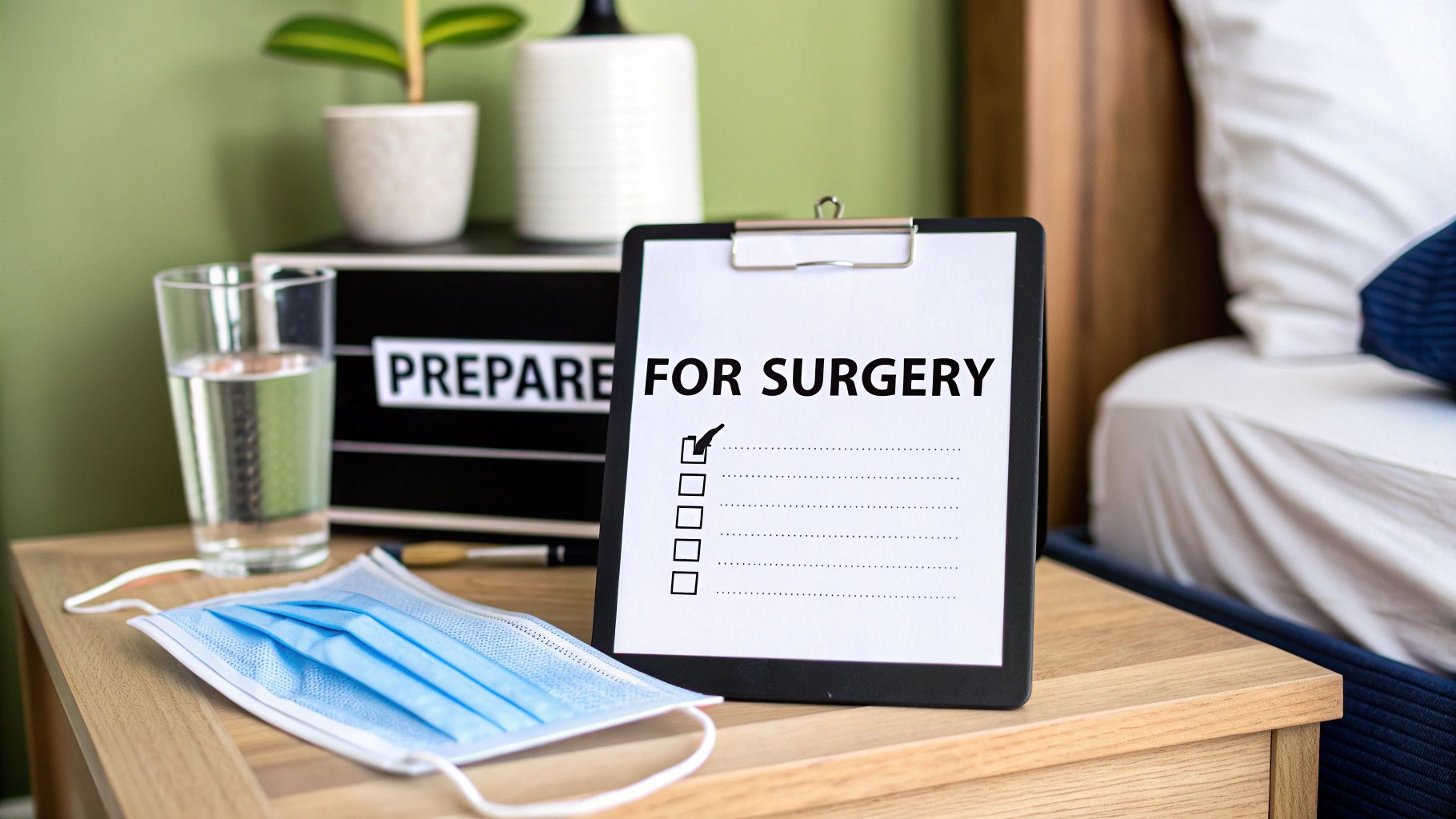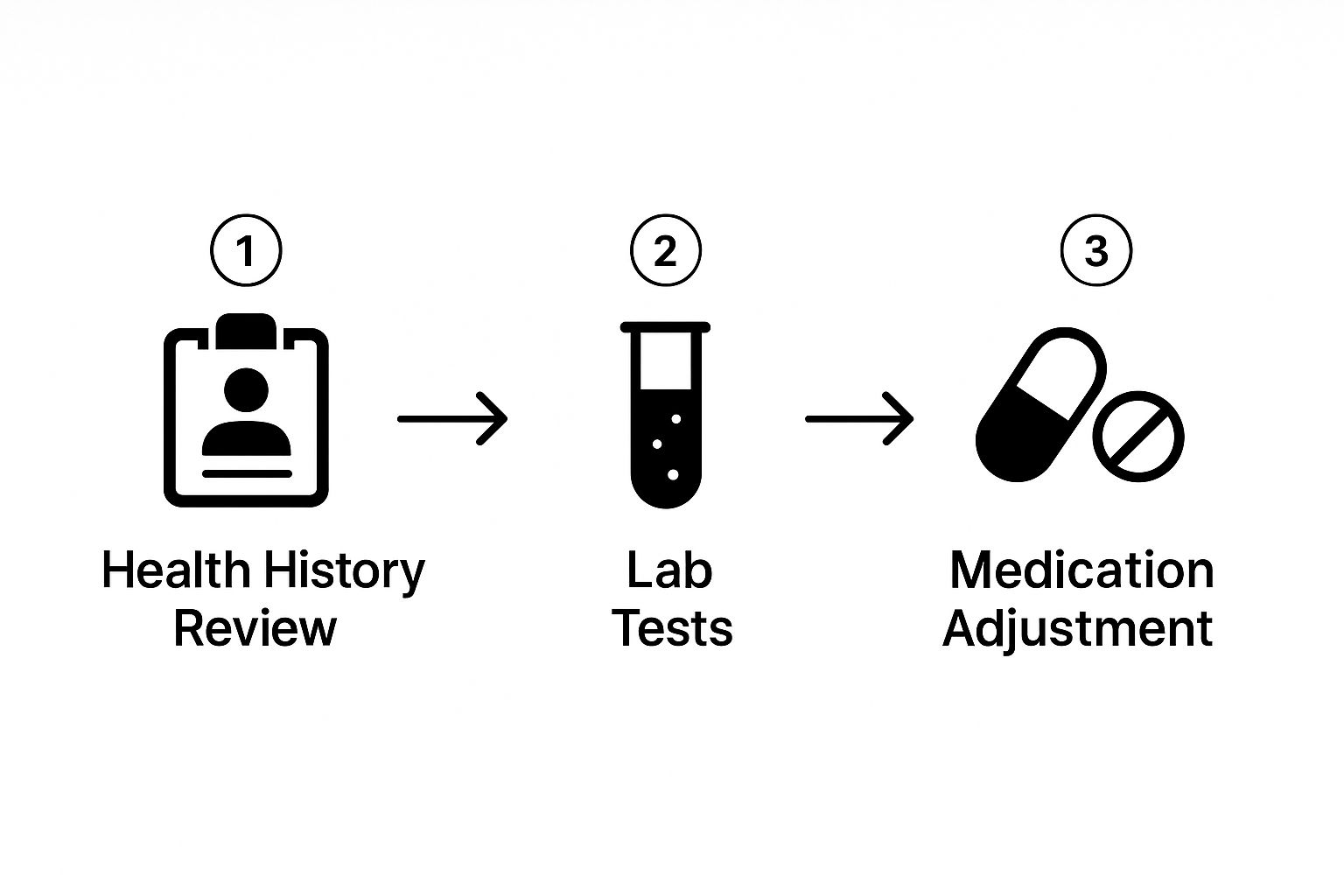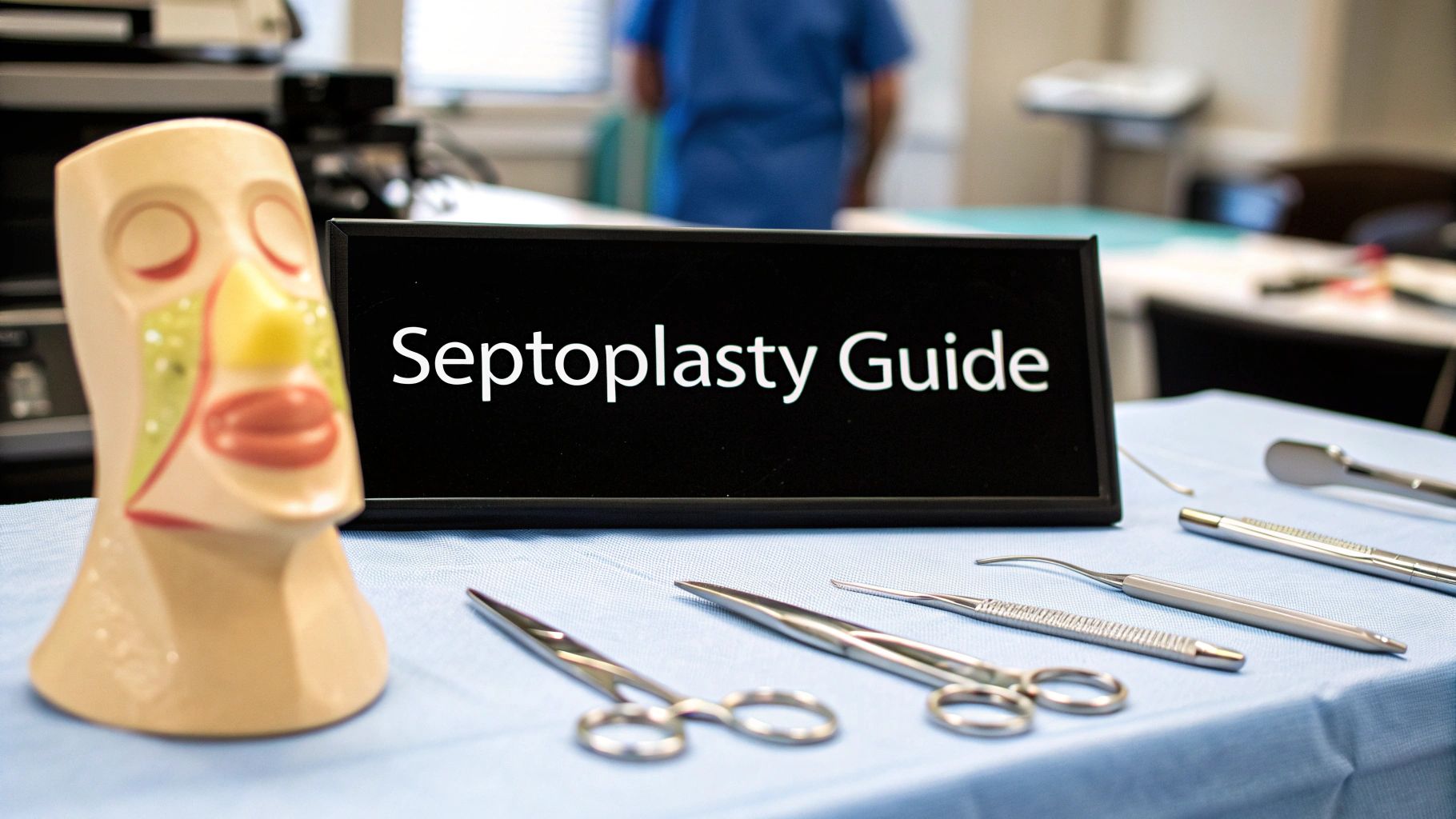
January 31, 2026
Your Week-by-Week Facelift Recovery Timeline
Navigate your facelift recovery timeline with confidence. This guide breaks down healing week-by-week, from day one to your final, natural-looking results.
Sep 10, 2025

Preparing for surgery is so much more than just circling a date on the calendar. It’s a dedicated process of getting your mind, body, and home ready for what's ahead, and honestly, the work you put in beforehand can make all the difference in your recovery.
From understanding your doctor's instructions to making small but significant lifestyle changes, every step you take is about setting yourself up for a smooth, successful outcome. Think of it this way: the better you prepare, the better you heal.

Walking into surgery can feel overwhelming, like being handed a map to a place you've never been. My goal here is to be your guide, turning that uncertainty into confidence by breaking down exactly what you need to do and when.
This isn't just a list of tasks; it’s a strategic overview that lays out a clear path. When you know the route, you can relax and focus on what’s most important—your health and recovery.
Knowing how to prepare for surgery gives you a powerful sense of control over your own journey. When you take an active role, you become a true partner in your care team, and that proactive mindset pays off in very real ways.
We see it all the time. Patients who are well-prepared tend to experience:
I like to break down the preparation journey into a few key phases. Each one has a distinct focus, making it all feel more manageable.
First, you'll tackle the medical clearances and necessary lifestyle adjustments. Once that's handled, your attention will shift to the practical logistics—things like setting up a comfortable recovery space at home and lining up a friend or family member for support. This systematic approach ensures nothing important gets missed.
The whole point is to create a seamless transition from your everyday life to the operating room and then back home again. Each step builds on the last, creating a solid foundation for healing.
Finally, where you have your surgery is a critical piece of the puzzle. It’s worth noting that many leading practices now have their own advanced facilities. Taking a moment to understand the role of on-site surgical suites in patient safety can offer tremendous peace of mind. Knowing you'll be in an accredited environment designed for the highest standards of care lets you know you’re in good hands from start to finish.
Once your surgery date is officially on the calendar, the real prep work begins. Think of the two to four weeks before your procedure as the final, critical phase where you fine-tune your body and logistics for a smooth experience. It's all about action now—getting your body in the best possible shape for what's to come.
Your pre-op appointments are not just a formality; they're an essential safety check. This is when your surgical team will do a deep dive into your health, running blood work, reviewing your medical history, and maybe even performing an EKG to ensure your heart is ready. Be an open book. This is not the time to hold back—every medication, every past illness, every supplement matters.
One of the most crucial conversations you'll have with your surgeon is about what you're putting into your body. You need to come prepared with a complete, detailed list of everything you take.
This isn't just about prescription medications. We're talking about over-the-counter pain relievers, daily vitamins, and even herbal supplements. Things that seem perfectly harmless, like fish oil, vitamin E, or ginkgo biloba, can actually thin your blood and increase bleeding risk during surgery. They have to be stopped well in advance.
Your surgeon will give you a very specific timeline—what to stop and precisely when. Follow these instructions to the letter. This isn't generic advice; it's personalized for you, your health, and your specific procedure to get your body in the optimal state for surgery and anesthesia.

This entire pre-operative process, from the medical review to medication adjustments, is a foundational part of your surgical journey. Taking these steps seriously is what truly sets you up for success.
Your daily habits leading up to surgery are just as important as the medical clearances. I often tell my patients to think of it like training for a marathon. You wouldn't show up on race day without preparing, and surgery is no different.
Here are the big lifestyle adjustments you should focus on:
These steps might seem small, but they make a world of difference. To put it in perspective, over 160 million people worldwide can't get the surgery they need each year, and of those who do, complications affect around 50 million. Diligent preparation is your best tool to avoid becoming a statistic.
To help you stay on track, I've put together a simple checklist for the weeks leading up to your procedure.
This table breaks down the key changes you can make to get your body ready for surgery and give yourself the best possible head start on healing.
Following these guidelines isn't just about ticking boxes; it's an active investment in your surgical outcome.
Key Takeaway: The choices you make in the weeks before your surgery—from the food you eat to the supplements you stop—are directly tied to a safer procedure and a smoother, faster recovery.
This is also a great time for a final gut check. If you have any remaining questions or anxieties, bring them up. Feeling 100% confident in your team is paramount. If you're having any second thoughts, reviewing a guide on how to choose the right plastic surgeon for your goals can offer some valuable reassurance.

When you get home from surgery, your one and only job is to heal. The absolute last thing you’ll want to be doing is hunting for the TV remote, struggling to get out of bed, or worrying about what to eat. This is where a little bit of planning beforehand makes all the difference.
Taking the time to prep your home before your procedure transforms it into a safe, comfortable sanctuary that supports your recovery from the moment you walk through the door. I’ve seen it time and time again—this is one of the most practical and impactful things you can do to prepare for surgery.
First things first, you need to set up a dedicated “recovery zone.” This is where you’ll spend most of your time for the first few days, so pick a spot that’s comfortable and easy to get to. For many of my patients, a recliner in the living room or a bed on the main floor works perfectly, especially if navigating stairs is going to be tough.
Once you’ve picked your spot, gather everything you could possibly need and place it within arm’s reach. This simple move saves you from unnecessary straining or having to get up every five minutes.
Your recovery station should be stocked with:
My rule of thumb for patients is this: if you even think you might need it, put it in the basket next to your chair. You will be so grateful for your foresight when you're settled in and don't want to move a muscle.
Let’s be honest, cooking will be at the bottom of your to-do list after surgery. But proper nutrition is absolutely critical for healing. The solution? Get your kitchen ready ahead of time. I always suggest spending an afternoon before your procedure to prep and freeze some simple, nourishing meals.
Think about things like soups, stews, or pre-portioned pasta dishes that you can just pop in the microwave. It’s also smart to stock your pantry and fridge with low-effort, high-value foods.
A few great choices include:
Having these items ready to go removes a huge source of stress and ensures your body gets the fuel it needs to do its job and repair itself.
Your mobility will likely be limited for a while, which can turn your familiar home into a bit of an obstacle course. Before your surgery, take a walk through your house and try to see it from the perspective of someone who might be unsteady on their feet or even using crutches.
Your goal is to create clear, wide pathways.
Taking care of these simple safety measures can prevent a fall, which could be a serious setback for your recovery. By handling these details now, you give yourself the freedom to focus completely on healing in a safe and supportive environment.
While everyone focuses on getting your body ready for surgery, what's going on in your head is just as important for a smooth recovery. It's totally normal to feel a cocktail of emotions—anxiety, a little fear, and a lot of anticipation. The first step is just to admit that you're feeling it.
The mind-body connection isn't just a trendy phrase; it’s a powerful reality. When you walk into that operating room with a calm, informed mindset, it can genuinely impact how you heal. We're talking better pain management and a quicker bounce-back. This isn't about pretending you're not nervous; it's about turning that fear into a sense of empowerment.
One of the best things you can do with all that nervous energy is put it to good use. The fear of the unknown is often the worst part, so arm yourself with knowledge. Sit down and make a list of every single question you have for your surgical team.
Seriously, don't be shy. Ask about the nitty-gritty of the procedure, the anesthesia, and what your recovery will look like day by day, even hour by hour. Getting a clear picture demystifies the whole thing and puts you back in the driver's seat. You'll shift from feeling like a passive patient to being an active partner in your own healthcare.
A calm mind supports a healing body. Simple techniques like deep breathing or mindfulness can lower stress hormones, reduce blood pressure, and create a better physiological state for surgery.
These small practices can make a huge difference. For instance, try "box breathing": inhale for a count of four, hold for four, exhale for four, and hold again for four. Doing this for just a couple of minutes can have a surprisingly powerful calming effect on your entire system.
You absolutely should not go through this alone. Now is the time to think about who your people are—the ones who can offer both practical help and a shoulder to lean on. Who can you count on for a ride? Who can help out around the house or just listen when you need to vent?
Being direct and clear about what you need is crucial. Let your friends and family know exactly how they can help you. Getting this all sorted out ahead of time builds a reliable safety net, which lowers the stress level for you and everyone around you.
Properly preparing for an operation is a cornerstone of getting better results. That's a fact recognized across healthcare systems worldwide. Since surgery is used to treat conditions that make up nearly one-third of the global disease burden, making sure patients are educated and ready is key to minimizing risks.
Your environment also plays a huge role in your state of mind. Creating a calm, organized space can do wonders for preoperative jitters. In fact, there's a well-documented the link between decluttering and mental well-being. A tidy home often leads to a clearer, more peaceful mind.

With just one day to go, your focus should shift to the small but crucial details. This isn't the time for second-guessing; it's about following a well-laid plan so you can walk into the hospital feeling calm and organized. The final 24-hour period is all about executing your surgeon’s instructions perfectly and handling any last-minute logistics.
A smooth final day really does set the stage for a smooth surgery day. When you methodically tick off these last few items, you're clearing your mind of last-minute anxieties. Think of it as your pre-flight check before taking off.
Your most important job right now is to follow your doctor's pre-op instructions to the letter. These are not mere suggestions—they are in place for your safety, especially concerning anesthesia.
Your team will have given you a strict cutoff time for eating and drinking. The rule is typically nothing by mouth (or "NPO") after midnight. This is non-negotiable, as it prevents the dangerous risk of aspiration, which is when stomach contents could enter your lungs while you're under anesthesia.
You've also likely been given a special antiseptic soap to use the night before or the morning of your procedure. This is a simple but powerful step that drastically reduces bacteria on your skin, which in turn lowers the chance of an infection at the incision site.
Crucial Reminder: I always tell my patients to set alarms on their phones for everything: the NPO deadline, when to take a final medication, and when to use the antiseptic wash. Don't leave it to memory. Precision is key.
These final steps are part of a much larger system designed to keep patients safe. Globally, a lack of safe surgical care contributes to an economic loss estimated at 1.3% of global GDP annually. Effective preparation, both by the patient and the healthcare system, is critical in reducing avoidable complications. You can read more about the global impact of surgical care on GlobalChildrensSurgery.org.
You’ll likely only be at the hospital for a short time, so pack light. A small bag with just the essentials will make your experience much simpler and keep your space free of clutter.
Here’s a quick list of what you should actually bring:
One last thing—give your ride a quick call. Confirm your transportation plans for getting to the hospital and, most importantly, make sure your designated driver knows the pickup time and location for taking you home. Tying up this final loose end means a seamless, stress-free start to your surgery day.
Even with a detailed plan in hand, it’s natural for new questions to surface as your surgery gets closer. Having a roadmap is one thing, but getting answers to those last-minute worries is what really helps you feel calm and confident.
Let’s walk through some of the most common concerns I hear from patients. Getting these cleared up will help you feel completely ready for the next step.
Knowledge is power, especially when it comes to your health. Before you head to that final pre-op appointment, take a few minutes to jot down every question on your mind. It's so easy to forget things in the moment, and having a list ensures you get the clarity you need.
I always tell my patients to focus on three key areas: the surgical details, the potential risks, and what recovery really looks like day-to-day.
Here are a few great questions to get you started:
This is also the perfect time to review your medication plan one last time. For cosmetic procedures, patients often have very specific questions about their final results. To help you cover all your bases, we've put together a detailed guide on the top questions patients ask before cosmetic surgery that you might find useful.
If you're reading this for a friend or family member, you should know that your support is one of the most valuable resources they have. Your role is part practical, part emotional, and both are incredibly important.
From a practical standpoint, offering to handle specific tasks can lift a huge weight off their shoulders. Think about being their driver on surgery day, helping set up their recovery space at home, or being the designated person to send updates to everyone else.
Emotionally, one of the most powerful things you can do is just listen. Let them talk about their excitement and their fears without feeling the need to solve everything. Often, just having someone to vent to is exactly what they need. You can also be a second set of ears during appointments, taking notes so they can stay focused. Your calm presence alone can make a world of difference.
A Pro Tip From Experience: Instead of guessing, just ask: "What would be most helpful for you right now?" This simple question lets them tell you exactly what they need, whether it's a hand with chores or just a friend to watch a movie with.
Yes, absolutely. Feeling anxious, nervous, or even a little scared before a major medical procedure is 100% normal. It would be more unusual if you didn't have some butterflies. The trick is to acknowledge those feelings instead of trying to push them away.
Most pre-surgical anxiety comes from a fear of the unknown. That’s why all this preparation we've been talking about is so powerful—every question you get answered and every task you check off your list replaces a piece of that uncertainty with a feeling of control.
When you feel that anxiety creeping in, go back to those mental readiness techniques. Try some simple deep breathing exercises. Talk to your support system about what’s on your mind. Remind yourself that you've chosen a skilled surgical team and have a solid plan in place. You've done the work, and that preparation is your best tool for staying calm.
At Cape Cod Plastic Surgery, our entire philosophy is built on the belief that a prepared patient is an empowered patient. If any more questions come to mind or if you’re thinking about a procedure, please schedule a consultation with our team. We're here to help you move forward with clarity and confidence.
You can learn more by visiting us at https://ccplasticsurgery.com.

January 31, 2026
Navigate your facelift recovery timeline with confidence. This guide breaks down healing week-by-week, from day one to your final, natural-looking results.

January 30, 2026
Curious about what is a septoplasty procedure? Learn about the surgery, recovery, risks, and benefits.

January 30, 2026
Why Board Certification Matters for Your Plastic Surgery Journey